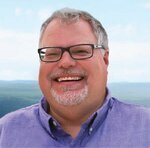

From the heights of the Mohonk Mountain House, on a sunny, peaceful November day, the forested nearby slopes and views of the distant Catskills seemed like a poignant counterpoint to the Affordable Housing/Open Space Conference taking place on the hotel grounds. This all-day event, entitled "Room Enough for Both," was about how to balance the need for one with the need for the other in the Hudson Valley. Among those attending were town supervisors Rich Parete of Marbletown and Mike Baden of Rochester. Both are on the front lines in the open space/ housing quandary. "I don’t begrudge anybody building a million-dollar-plus home and selling it, you can’t buy a piece of property today, build a $200,000 home and sell it, you’re going to lose money, because the costs of building are so expensive, the cost of land,” commented Parete. Marbletown has instituted a one-time real estate purchase tax for homes in the upper-income brackets to fund a community land trust.
In Rochester, where there are still a number of small farms and the potential for more, "the town is changing the Residential Agricultural zoning district to Local Agricultural, removing the word residential to emphasize the farmland aspect first," Baden explained. "We also are making conservation subdivision mandatory for areas containing soils listed as "Prime Farmland" by the U.S. Dept of Agriculture. This will allow some subdivision but protect a portion of the land for farming or recreational use."
The roster of speakers at the conference came from both ends of the spectrum, from land preservationists to developers, and a surprising amount of people who were involved in trying to harmonize these seemingly opposite positions. Mohonk Consultations, a nonprofit based at the Mountain House, was the sponsor. Chair Lisa Finn offered an acknowledgement of the First Peoples whose land the hotel stands on and, as per Quaker custom, called for a moment of silence.
Her cousin Tom Smiley, like Finn a member of the Smiley family who have owned and managed the Mountain House and have been neighbors of the Mohonk Preserve since the late 19th century, related how the housing crisis was affecting his business. Since 2019 "it's been increasingly challenging to find housing for the hotel staff," he said. "Unfortunately, we didn't have any quick solutions." He now serves on the Ulster County Housing Advisory Committee.
Representative Jen Metzger said that when she was growing up, "because we couldn't afford a place to live, we were moving all the time," giving her a personal connection to people who find themselves in similar circumstances. In Ulster County, "two years ago the average stay of a family in emergency housing was about four months. Today, it is 20 months." Development is urgent, she stressed. "That can be redevelopment ... but there's going to be some greenfield development. There just is. Because the shortage of housing is too huge ... but solutions exist to address the climate crisis and the housing crisis at the same time."
Adam Bosch, CEO of the nonprofit Hudson Valley Pattern for Progress, came armed with statistics. From 2016 to 2023, he said, average housing prices have doubled in the area. Paradoxically, this has happened while the Hudson Valley has actually lost population. The price of real estate is "far and away" the main reason so many people end up moving to the Carolinas, Florida and elsewhere (besides wanting to go where taxes are lower). Twenty-five years ago, there were actually 134,500 more people living here, he said. There is a "young people shortage," smaller families means more houses for smaller family units. "You're essentially taking the same size pie and cutting it into more slices." People seeking to buy are not finding anything. "Homes are either "very very expensive, or else in extremely bad shape. That's what's for sale right now."
As a result, "Everyone in this room" has probably said "Hey, I'm having a hard time finding workers. 'Please excuse us, we're understaffed,’ or some version of that ... I called up my doctor today for my annual physical and they said 'We're scheduling ten and a half months out.' Teachers, childcare workers, restaurant staff, are all scarce. "You're starting to see businesses closing because the baby-boom generation owner can't find someone to pass it on to."
Steve Rosenberg, former director of Scenic Hudson Land Trust, talked about the "increasingly fragmented rural landscape" and New York state’s goal of "conserving 30% of its land and waters by 2030. That means conserving a lot more land in the Hudson Valley." He has become committed to the affordable-housing cause as well. He talked about fighting the NIMBY ("not in my backyard") syndrome. "People are highly sensitive ... I've never met anyone who admitted" to that sentiment, he said, to audience chuckles. It's a challenge to talk NIMBY "without stigmatizing or alienating anyone." He said people tend to think "on a hyper-local scale rather than think about the bigger picture."
Zoning for single-family homes to the exclusion of either larger units or farm-related businesses "makes it virtually illegal to build the kind of housing we need." Yet there are stringent state requirements on affordable housing units, and they are often "the most efficient projects around." Building them in town centers also "takes the pressure off the countryside ... it comes as a surprise to many" that the goals of the affordable-housing and environmental movements are pretty well aligned, Rosenberg said. The region should not be treated as a museum piece, "a thing to be curated," but be open to change and adaptation to new realities both social and environmental.
Mike Baden, sitting in the audience, had a question for Adam Bosch. "Affordable housing has a real stigma attached to it, both to the general population and to the people who might need it," said Baden. "The terminology of 'workforce housing' has helped to change that a little bit, but ... how do we get the message out that affordable housing is about real people that are part of the community?" Bosch returned that it takes a lot of patience to get people to realize that "Affordable means something different to everybody." Rosenberg added that people will listen more depending on "who is sending the message." Open-space advocates like himself who see the need for housing can change the minds of their neighbors who don't want change.
Rod McKuen, supervisor of Red Hook, had a success story to tell. His town created a community land trust and were able to buy a piece of property that had been a working farm. Part of the land will be conserved, and on the rest, homes will be built for sale at below-market rates, with the caveat that those houses can't be sold at market rate when they change owners.
Kai Lord-Farmer, who works for Ulster County as a planner in workforce housing/climate action, said, "We're doing a site inventory of everywhere that there's a potential for an affordable housing development, and we're also bringing in community members to help design what affordable housing might look like in their community. You can't be a NIMBY if you're the one who's designing the project." He believes "the crisis itself is an opportunity. I'm hearing from my staff that folks are talking about ideas that they never thought they would hear communities talking about." Housing solutions that accommodate open space as well depend on "political will," said McKuen, "elected officials who don't cave" to special interests, on being OK with "not having everyone love you," said Lord-Farmer, and on "finding the right way to communicate," said Weston Minissali, who works for Taproot Community Land Trust.
Thinking back later on what he had heard at the conference, Parete said, “I definitely liked the Community Land Trust and the Housing Trust [ideas]. In Marbletown, we’ve got the Mohonk Preserve, we’ve got part of the DEC watershed” surrounding the Ashokan reservoir. “The community preservation fund is going to help preserve more properties down the road that the community thinks are appropriate. At the same time, we recognize that people have to have a spot to live, an affordable place to live, and ‘affordable’ is different for everybody … it can’t all be "900,000 and up." He envisions working to procure federal or state housing grants, “whether they’re rentals or you can buy ‘em or a combination of both. In Marbletown, the board is really committed to working on our zoning laws" to accommodate "housing for teachers and service-industry workers and firemen and police officers … our comp plan calls for that … we need to encourage it, to support it. Our hands are a little bit tied … we’re limited, we’re not an urban area that’s got water and sewer. We can’t have too dense housing.”
Asked how much money the real-estate purchase tax had brought in this year, Parete replied, " As of August I believe we’re at about $220,000 ... I’m hoping we can have $250,000 to $275,000 [by the end of the year]. The purpose is to preserve farms and/or to purchase easements [on] properties to extend trails, or to preserve ecologically sensitive areas, which as a community we would like to see preserved as open space … OSI, the Open Space Institute, recently purchased the 97-acre Osterhoudt property, near the Marbletown school off Atwood Road. We entered into an agreement with OSI to purchase it for $1.1 million.” Possible plans include trails, a gazebo, community gardens, as well as wildlife habitat, “things that the people in this community are interested in … that’s where this money is going to go.”
Baden said one thing stuck out for him. "I loved hearing from the professional developer Kearney Group about how these types of developments can work." Kenneth Kearney had explained how he had managed to put up mixed-use and affordable housing in the region and made it a profitable business.
"Getting community buy-in can be hard," Baden reflected, "but can be accomplished with facts rather than rumor and imagined incorrect ideas of what affordable housing means and the people who need it. It is a one parcel at a time type of action."